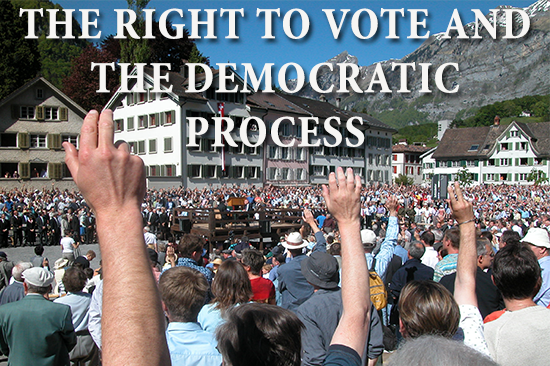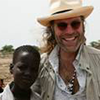The Right to Vote and the Democratic Process
 Many people who were born with the right to vote have become jaded about it. They
rationalize that their one vote can’t matter against the backdrop of millions of other
votes. Further, they say, their vote can’t counteract the huge amounts of money that
corporations, special interest groups, and “the wealthy few” invest into electoral
campaigns. A single vote, many people conclude, is too insignificant to matter.
Many people who were born with the right to vote have become jaded about it. They
rationalize that their one vote can’t matter against the backdrop of millions of other
votes. Further, they say, their vote can’t counteract the huge amounts of money that
corporations, special interest groups, and “the wealthy few” invest into electoral
campaigns. A single vote, many people conclude, is too insignificant to matter.
But voting is vital to our modern world. It is those people in the world who can’t vote—and the many for whom there is only one candidate on the “ballot”—who are the most vulnerable. They are the ones who can’t alter the course of their lives. They are the ones whose children are most likely to face limited prospects and diminishing opportunities. They are the ones for whom the only recourse is to either leave their home country, or to engage in a hostile conflict. To these people, the right to vote would be cherished.
Today, only about one third of the world’s population lives in countries with full and free democracies. The majority of countries, in both Africa and Asia—the very parts of the world facing some of most pressing challenges to human health and welfare—are not included in this list.
Those of us with “the vote” must recognize, of course, that the process of voting is only one relatively small part of the democratic process. That process begins with frank discussions with our co-workers and neighbors; open dialogue with our elected officials; a willingness to listen—truly listen—to the opinions of others; an ability and an obligation to express our own views, and, above all else, the recognition that sometimes each of us must be willing to change our views. When all of that is done, “the vote” itself is a statement of commitment not just for the issue or the candidate that we are voting for, but also for the very process that the ballot box represents.
We must protect and exercise our own right to vote, and become champions for that same right for people living around the world.
The authors would like to thank Ms. Katie Neel, MPH, for conducting initial fact-checking
for this article. The authors would also like to thank Alli Proffitt, Kate Etue, Brad
Lifford, and Dara Young for remarkably thoughtful and insightful editing and other
invaluable contributions.
This article reflects the personal views of the authors and does not necessarily represent
the views of their employers, co-workers, or others.
| Title | Info |
|---|---|
| Blog Posts |
Natural and Man-Made Disasters The U.S. Criminal Justice System Creativity and Freedom of the Press |
 Stout Drive Road Closure
Stout Drive Road Closure 

